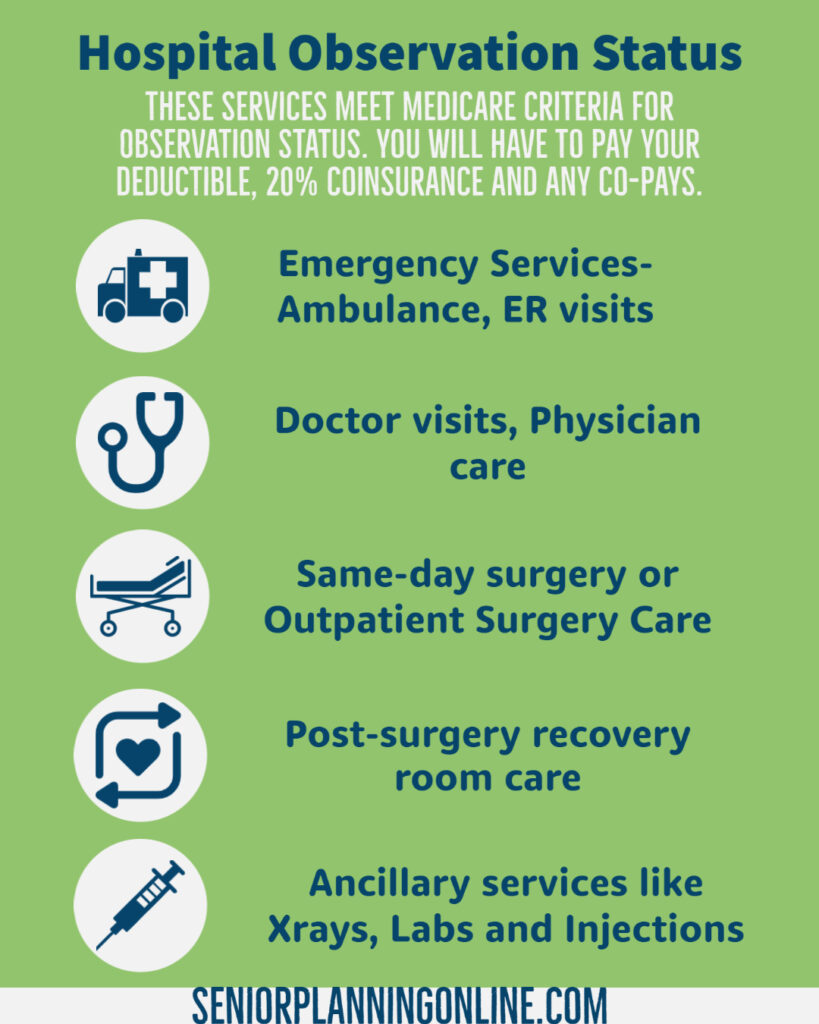When you go to the hospital for an emergency or a treatment, you as the patient are assigned a status.
If you are admitted to the hospital to stay overnight, you could be placed in 1 of 2 admission statuses.
Observation/Outpatient Status OR Inpatient Status.
Did you know the status you are placed under when you admit to the hospital could affect your hospital bill?
When you are admitted into the hospital, paperwork for you to fill out and read is thrown at you left and right.
How are you supposed to read and understand all of this paperwork when you are in pain or discomfort? You are just trying to get the care you need! Right?
Usually once you are admitted to the hospital for an overnight stay, within 24-48 hours you should receive a notice that explains which status you have been placed under.
This is when you find out if you are in Observation (Outpatient) Status or Inpatient Status. But why does this matter? I’m going to review with you what each status means and how it affects how much you pay for your hospitalization.
Observation vs Inpatient
I’m going to preface this first with saying: the status you are placed under relates to which criteria you meet under CMS (Centers for Medicare & Medicaid Services) requirements.
CMS regulates the United States Healthcare programs. They produce the rules and regulations for everyone in the healthcare industry. They also regulate the Medicare and Medicaid programs.
So when you are admitted, I would suggest that you don’t lash out at the doctors immediately. They are just trying to follow the regulations set forth by our government.
What is Observation Status?
This is also known as Outpatient status. You are admitted under this status with the primary means of receiving what is considered “outpatient” services by Medicare.
CMS says that observation services are outpatient services that are used to help evaluate a patient’s condition.
This could include the ancillary/outpatient services outlined in Medicare Part B.
Check out the post “Why You Should Care About Medicare Part B”? for more details on those services.
During the time the patient is under Observation status, physicians and professional licensed clinical staff should also be determining if the patient needs to stay in the hospital longer than 48 hours. Or they need to determine if the patient needs treatment and care, meeting criteria for Inpatient status.
The following are some of the medical services CMS identifies as being outpatient or observation hospital services:
- Emergency services
- Primary-Care services
- Ancillary services
- Same day surgery
- Recovery-room services

What is a MOON letter?
When you are admitted to the hospital under Observation status, you are required to get a letter outlining why you are under Observation status.
This is called the MOON letter. (Medicare Outpatient Observation Notice)
When you get this notice, PLEASE READ IT!
Most of the time a case manager or another hospital admin comes and gives you this letter. They drop it off and ask for your signature saying that you received this letter and understand it.
I would suggest that you read the letter before signing it. However, it really doesn’t matter if you sign it. It won’t change your status even if you disagree with it.
It’s just paperwork the hospital is required by law to provide to you.
If you refuse to sign it, the hospital just documents that you refused to sign it but were still provided the notice.
Click Here for an example of what the MOON letter looks like. This is directly from the CMS.gov website.
Does Medicare Pay for Observation Status?
When you are admitted under observation or outpatient status, hospitals usually bill under Medicare Part B.
Confused?
I know, I know, I know. What I said in Services Covered by Medicare Part A says that a hospital stay should be covered under Medicare Part A…right?
Yes, this is true, as long as you are admitted under “Inpatient” status. It only covers “Inpatient” services.
If you admit into the Hospital under Observation, your services will be billed under your Medicare Part B.
With your Medicare Part B, you will have a copayment for each outpatient hospital service you receive.
Most of the time your co-pay is 20% of the Medicare-approved cost for the service.
This is of course after your Medicare Part B deductible is met.
Are Medications Covered Under Observation Status?
So here is the other thing people don’t realize…
Because your observation status is billed to Medicare Part B, the medications you may receive during your hospital stay may not be.
Hopefully you read What is Covered by Medicare Part B. We reviewed that there are SOME medications covered under Medicare Part B.
The important thing for you to know is that if you are in Observation status at the hospital, any of your home medications or over-the-counter drugs/vitamins you take at home are not covered by your Medicare Part B.
You will be billed for these medications by the hospital if you are administered them.
To cut costs, you are generally allowed to bring in your home medications to the hospital. They can usually administer the medications you bring from home while you are at the hospital if needed.
However, any NEW medication that is prescribed to you during your hospital stay is usually covered under Medicare Part B or it can be billed to your prescription drug plan. AKA Medicare Part D.
*If you DO get billed medications from your observation stay, you can submit a claim to your prescription drug plan (Medicare Part D) for a refund. So don’t freak out!
How Does Observation Status Affect How Much I Pay?
As mentioned above, observation status may affect how much you pay for medications that you need while you are at the hospital.
You are also responsible for that 20% co-pay for EACH outpatient service you are provided with at the hospital. That can add up QUICKLY.
It also affects your eligibility for skilled nursing facility care.
Make sure to check out the posts Does Medicare Pay for a Skilled Nursing Facility and How Do You Qualify for a Skilled Nursing Facility about how eligibility for skilled nursing care works.
To qualify for a skilled nursing facility for rehab you must have at least 3 “inpatient” midnights at the hospital.
So as long as you are in “observation” status, those midnights are not included to qualify.
What is the Average Cost of Observation Stay?
Cost of care is shifting. I can tell you that everyone is different because everyone has a different need.
You might need more tests to determine your treatment plan. You might have a complicated same-day surgery.
The cost of care changes. Unfortunately health is expensive.
A study was done to examine the average costs of care for someone under observation status. In 2015, the mean total cost of an observation stay was $8,162 according to the study. The mean for out of pocket patient expenses were around $962.
What is Inpatient Status?
Inpatient status means that your hospital stay will be billed under your Medicare Part A insurance.
At this point you have met the CMS criteria for an inpatient stay.
This could mean that the doctors feel you will be staying for longer than 48 hours. This is also known as the Medicare 2-Midnight Rule.
At this time your doctors generally have a diagnosis and a treatment plan.
In most cases, doctors will go ahead and switch you from observation status to inpatient status after 2 midnights.
If they don’t, you will want to ask them why you haven’t been switched. If you have a Medicare Advantage Plan or a Commercial Insurance plan, there may be different rules.
Does Medicare Pay for Inpatient Status?
Yes. This is when your Medicare Part A is billed and covers your inpatient treatment.
Check out the post Services Covered by Medicare Part A for more details on what is covered during your inpatient stay.
Are Medications Covered Under Inpatient Status?
Yes. The medications you receive while you are under the inpatient status should be covered. This includes your home medications and over-the-counter medications you were taking at home.
If you receive a bill that reflects differently, first contact the hospital billing department to see if there was a mistake.
If there wasn’t a mistake and they explain why a certain medication was billed, make a claim through Medicare Part D prescription plan.
How Does Inpatient Status Affect How Much I Pay?
As mentioned previously, your medications will be billed under your Medicare Part A rather than your Medicare Part B.
Rather than having to pay your Medicare Part B deductible AND a 20% co-pay for every little service you receive, you will be responsible for your deductible and then a $0 co-pay for the first 60 days of care.
If you need skilled nursing facility rehab after you discharge, after 3 midnights under inpatient status, you will be eligible for this benefit.
As long as you are eligible for this patient, you have a $0 copay for skilled nursing rehab for the first 20 days of rehab.
Again, make sure you check out Does Medicare Pay for a Skilled Nursing Facility and How Do You Qualify for a Skilled Nursing Facility for details.
Can I Appeal My Hospital Admission Status?
Prior to 2020, if you were admitted to inpatient status initially but then then changed to observation status the patient did not have the ability to contest this.
Sometimes people are admitted directly as an inpatient and skips the observation status. That could be because the doctor was unsure what the criteria was for each status. Or it could have been a human error on the doctor’s part. Or it could be that criteria was met according to the doctor but then insurance came back and said they didn’t meet criteria.
Prior to 2020, hospitals would usually appeal the status change, fighting against the denials from CMS. Hospitals needed to get paid and were getting denied.
This also affected patients who were now stuck with an astronomical bill all of a sudden.
The Alexander v. Azar case
In March of 2020, the Federal Courts ruled in favor of allowing patients to appeal their hospital status. Now this is only for patients who are first placed on Inpatient status and then are changed back to Observation status.
Patients can be empowered over their own healthcare now and don’t have to rely on the hospital staff to fight for them.
If you want more information on the court ruling and case, check out the Justice In Aging organization. They are a fabulous organization dedicated to advocacy, training and litigation for Seniors in the U.S.
I hope this post provides you with the education and empowerment you need to fight for your patient rights and lower your healthcare costs. If you have questions or comments I welcome them below!


No responses yet